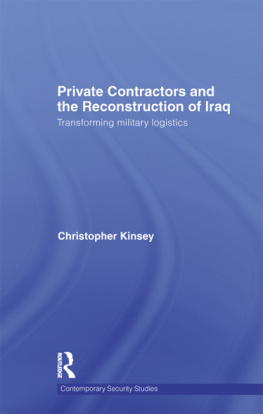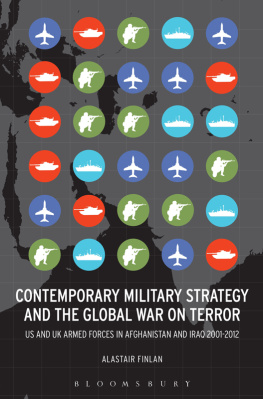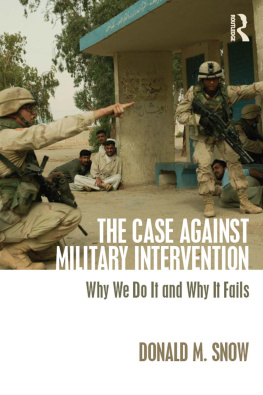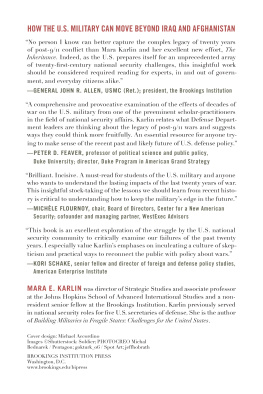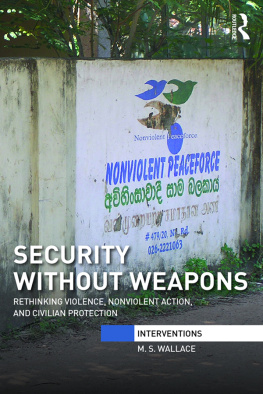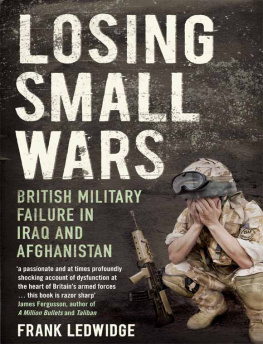
The New Spatiality of Security
This book provides a rigorous critical analysis of how the US military operates in Iraq, exploring the spatial practices of violence.
Contemporary critical analyses of the United States involvement in Iraq and Afghanistan emphasize the hegemonic nature of the US military experience, while conventional military analyses focus on fixed categories such as counterinsurgency or network-centric warfare. Drawing on fieldwork examining the use of a new command and control technology by 1st Cavalry Division (US Army) in 20042005, this book elaborates a more nuanced understanding of US military violence by exploring the changing (and sometimes incoherent) spatial practices through which violence was exercised.
The author combines fieldwork with a spatial vocabulary of violence from the work of Michel Foucault, Henri Lefebvre, and Gilles Deleuze and Flix Guattari and methodological inspiration from the micro-observations of material semiotics in Science and Technology Studies to conclude that the US Armys experience in Iraq has been neither as circumscribed nor as easily defined as critical theorists and conventional military analysts alike would suggest.
This innovative book will be of much interest to students of critical security studies, strategic studies, military studies, social and spatial theory, and IR in general.
Caroline M. Croser is a Lecturer in Politics at the University of New South Wales at the Australian Defence Force Academy, where she teaches defence studies.
Routledge Critical Security Studies Series
Titles in this series include:
Securing Outer Space
Edited by Natalie Bormann and Michael Sheehan
Critique, Security and Power
The political limits to emancipatory approaches
Tara McCormack
Gender, Human Security and the United Nations
Security language as a political framework for women
Natalie Florea Hudson
The Struggle for the West
A divided and contested legacy
Christopher S. Browning and Marko Lehti
Gender and International Security
Feminist perspectives
Edited by Laura Sjoberg
Reimagining War in the 21st Century
From Clausewitz to network-centric warfare
Manabrata Guha
The New Spatiality of Security
Operational uncertainty and the US military in Iraq
Caroline M. Croser
The New Spatiality of
Security
Operational uncertainty and the
US military in Iraq
Caroline M. Croser
First published 2011
by Routledge
2 Park Square, Milton Park, Abingdon, Oxon OX14 4RN
Simultaneously published in the USA and Canada
by Routledge
270 Madison Avenue, New York, NY 10016
Routledge is an imprint of the Taylor & Francis Group, an informa business
This edition published in the Taylor & Francis e-Library, 2011.
To purchase your own copy of this or any of Taylor & Francis or Routledges
collection of thousands of eBooks please go to www.eBookstore.tandf.co.uk.
2011 Caroline M. Croser
All rights reserved. No part of this book may be reprinted or reproduced or utilized in any form or by any electronic, mechanical, or other means, now known or hereafter invented, including photocopying and recording, or in any information storage or retrieval system, without permission in writing from the publishers.
British Library Cataloguing in Publication Data
A catalogue record for this book is available from the British Library
Library of Congress Cataloging-in-PublicationData
A catalog record has been requested for this book
ISBN 0-203-84203-0 Master e-book ISBN
ISBN13: 978-0-415-56522-6 (hbk)
ISBN13: 978-0-203-84203-4 (ebk)
To EAC and BJC, with love and gratitude
Preface
War is undoubtedly hell, but todays wars (or at least those involving Western powers) are also undoubtedly bureaucratic. This is a truth which I did not fully appreciate until I deployed with the Australian Defence Force to the Middle East Area of Operations in 2009, three or so years after I first formulated the arguments in this book. While on deployment, I witnessed first hand the incredible amount of bureaucratic work (literally paper work) performed each and every day to keep troops fed, housed, clothed, and led as well as keep defence leaders, bureaucrats, politicians, the media and the public informed about the activities of their armed services. I am not sure what I expected, but now when I think of military headquarters especially senior headquarters I think of nothing so much as contemporary office blocks, with open plan floor spaces, plentiful instant coffee, and cheap office furniture (with the exception of the soon to be defunct headquarters of the International Security Assistance Force in the centre of Kabul, which more resembles a North American university campus). In these offices-cum-headquarters, a legion of staff officers are busily pummelling information into shape; pushing information up or down command chains; and ignoring or panicking over reports as they see fit.
But command chains and bureaucracies do more than manage information. Indeed, as I was very aware during my deployment, the seemingly innocuous act of managing even mundane information is actually a politically charged act involved in shaping reality. Following the methodology outlined in this book, each and every one of the bureaucratic interventions I witnessed on deployment (every logistics request, every Noting Brief about a specific operation) was an active participant in forming the reality (realities) of modern war. And there are literally thousands of them every day.
But what does it mean that we (the West) have such a bureaucratic way of war? Or, put another way, how do the dynamics of a modern, information-fedbureaucracy affect the conduct of violence? At least in retrospect, this seems to me to have been the driving force behind the development of the arguments in this book. To my mind, conducting such an analysis enables a mode of criticism that is more resonant and more concretely founded in peoples experiences of the modern military. It is strange that as members of modern, liberal democratic states, we have (through long experience) been stripped of our naivety about the ability of government to fully control the outcomes of large-scale projects to deliver public goods such as education and health, but that we continue to have very high expectations regarding the ability of our defence forces to consciously control and alter the way they conduct violence. What I wish to suggest, then, is that in the realm of critical security studies, we might achieve more if we maintain a sense of how hard it is to coordinate anything large and complex, if only because it may well provide a better basis for our own policy prescriptions.
At its essence, then, what this book seeks to do is explore how the violence of a large, information-dependent, and yes, bureaucratic US Army Division was coordinated through its spatiality and how that coordination was continually frustrated by the obduracy of materiality.


